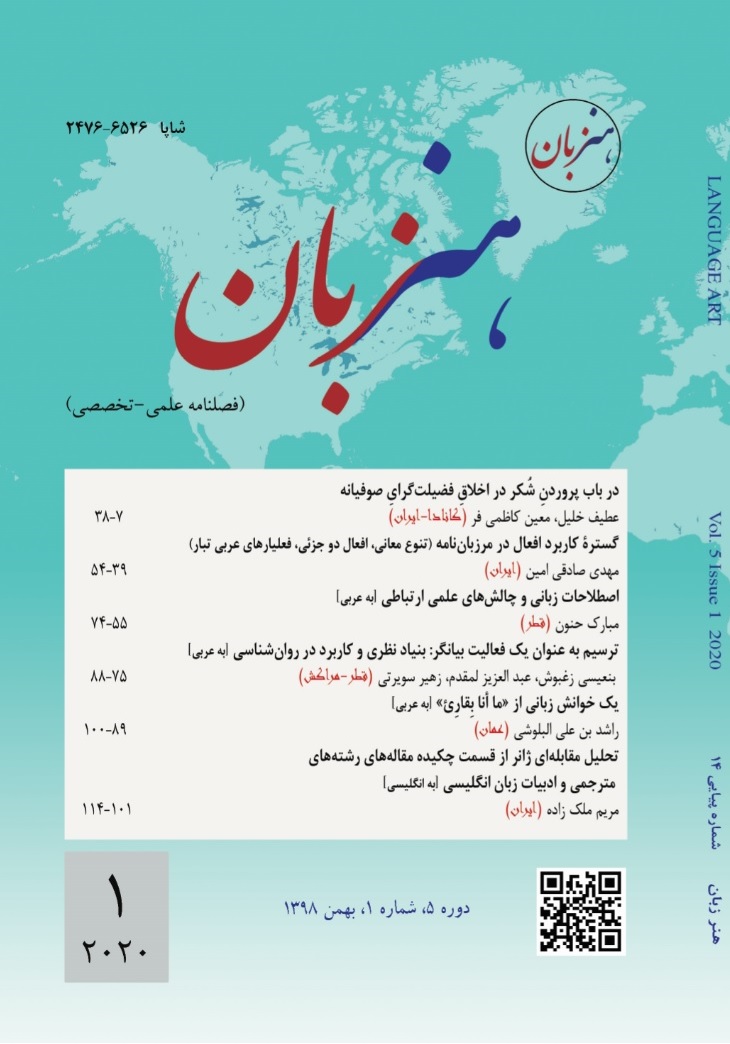قراءة لغوية في "ما أنا بقارئ
DOI::
https://doi.org/10.22046/LA.2020.05کلمات کلیدی:
«ما» نفی، «ما» استفهامی، «باء» تاکید، ابزار نفی متضاد.چکیده
هنگامی که فرشته جبریل (علیه السلام) برای اولین بار در غار حراء با پیامبر اکرم (ص) ملاقات کرد، از او خواست که (از روی قرآن کریم) بخواند، گفت «بخوان»، سه مرتبه، و هر بار پیامبر (ص) با گفتن «ما أنا بِقارِئ» پاسخ داد. مفسرین بدین معانی «من خواننده نیستم» یا «نمیتوانم بخوانم» تفسیر کردهاند، و بیان شده است که پیامبر (ص) قبل از آن جلسه قرآن کریم را نمیشناخت. این مقاله به این مسئله میپردازد، و با ارائهی تحلیل زبانی، خوانش دیگری را برای این جمله از پیامبر اکرم (ص) ارائه میدهد که نشان میدهد که این جمله میتواند معنای دیگری داشته باشد حتی معنایی متضاد تفاسیر گفته شده. تجزیه و تحلیل، فرض میگیرد که «ما» در این جمله «ما» استفهامی است و نه «ما» نفی، و نشان میدهد که این جمله ممکن است به معنای «من چه چیزی را بخوانم؟» باشد، نشان میدهد که پیامبر اکرم(ص) قبل از اولین ملاقات با فرشته جبرئیل (علیه السلام) قرآن کریم را میدانسته است.مراجع
Aḥmad ibn Ali ibn Ḥajar al-Asqalan (1960). Fatḥ al-bārī bi-ʃarḥ al-Bukhārī, Riyadh: The Salafi Library.
Al-Balushi, Rashid (2019). Subject licensing in non-verbal clauses in Arabic. Brill’s Journal of Afroasiatic Languages and Linguistic, 11(2):249-282.
Al-Bukhari, Abu Abdullah Muhammad ibn Ismail Al-Bukhari (1980). al-Jāmiʻ al-ṣaḥīḥ lil-Buxārī (Part One), Cairo: Salafi Press.
Al-Bukhari, Abu Abdullah Muhammad ibn Ismail Al-Bukhari. (2013). Kitāb al-Tārīkh al-kabīr. Riyadh: Heritage Center for Programming.
Al-Jallad, Ahmad. (2009). The etymology of the indicative augment b- in some neo-Arabic dialects. Afroasiatic studies in memory of Robert Hetzron, proceedings of the 35th annual meeting of the north American conference on Afroasiatic linguistics (NACAL 35), edited by Charles Haberl, 209-231. Cambridge Scholars Publishing, Newcastle.
Al-Muhajir. (n.d.). dirāsa (ma) al-estifhāmiat fi al-Quran al-Karim [lesson]. Available at: http://jamharah.net/archive/index.php/t-13611.html [Accessed 2020.10].
Al-Musawi, K. (2012). harf al-jara (al-bā') wamaāniyah [lesson]. Available at: http://www.uobabylon.edu.iq/uobcoleges/lecture.aspx?fid=8&lcid=25644 [Accessed 2020.10].
Al-Naderi, Muhammad Asaad Al-Nadri (1997). Naḥw al-lughah al-ʻArabīyah. Beirut: The Modern Library.
Al-Sha’raawi, M. (2018). al-nabi al-umi .. ʃarh al-āya .. al-ʃayx Muhammad Mutawali al-ʃa’rawi. [video]. Available at: https://www.youtube.com/watch?v=TqmH1f8qzhc [Accessed 2020.10].
Gabr, Y. (2018). Al-ʃafāat al-Muhammadiyat wa al-salawat al-Ahmadiat wal-haqiqat al-Muhammadiyat wal-salat al-meʃiʃiyat. [video]. Available at: https://www.youtube.com/watch?v=WvcbAMaBSCE [Accessed 2020].
Ibn Habban, Abu Hatim Muhammad Ibn Habban Al-Tamimi. (2004). Sahih Ibn Hibban. Lebanon: Sherkat bayt al-afkar al-duwalia.
Ibn Hanbal, Imam Abu Abdullah Ahmed ibn Muhammad ibn Hanbal Al-Shaibani Al-Dahli (2008). Al-Masnad. Beirut: Scientific Books House.
Ibn seyyed al-Nas, Abu al-Fath Muhammad ibn Muhammad (1986). Euun al-asar fi funun al-maqāzi wa al-ʃamāel wa al-sir (Part One). Beirut: Ezz El-Din Foundation for Printing and Publishing.
Muslem, Abu al-Hussain Muslem ibn Al-Hajjaj al-Qushairi al-Neysaburi (2000). Sahih Muslem. Cairo: Islamic Thesaurus Association.
Nemer, A. (n.d.). ʃarh al-hadith (kitāb bad' al-wahy- fath al-bary fi ʃarh sahih al-buxāri. [lesson]. Available at: https://sites.google.com/site/yehiamlolosite/yehiamlolo-2/yehiamlolo3 [Accessed 2020.10].
Pietarinen, Ahti-Veikko. (2001). What is a negative polarity item? Linguistic Analysis 31(1): 165-200.
##submission.downloads##
چاپ شده
ارجاع به مقاله
شماره
نوع مقاله
مجوز
حق نشر 2020 راشد بن علي البلوشي

این پروژه تحت مجوز بین المللی Creative Commons Attribution 4.0 می باشد.
فصلنامه هنر زبان یک مجله دسترسی آزاد است و مقالات پس از پذیرش در دسترس عموم قرار می گیرند و استفاده از آن با ذکر منبع آزاد است
